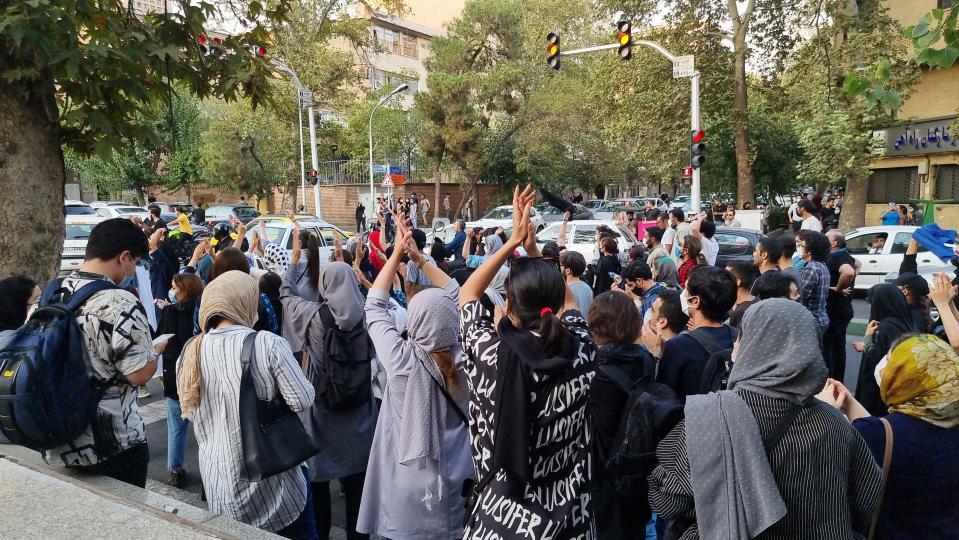Iran's Gen Z is fed up. The protests aren't just about hijab, they're about regime change.
Those are the words Iranian women have been chanting during protests against their government for the past several weeks. Used by Kurdish female soldiers in their fight against the Islamic State terrorist group, these words also define the very essence of the ongoing protests against the Islamic Republic of Iran that at minimum say women demand a life of freedom.
These protests are in response to the death of 22-year-old Mahsa Amini, from Iran’s Kurdistan region. In the capital city of Tehran to visit family, Amini was arrested on Sept. 13 by the morality police for “wearing inappropriate clothing.” This police group patrols public spaces looking for people – especially women – who violate the norms of “public decency” with their clothing, haircuts, behavior and “bad” hair coverings. Amini died in custody after spending three days in a coma.

Amini’s death comes from the intensification of repressive state policies under President Ebrahim Raisi's administration. It recently announced the intention to aggressively target women not in “modest dress” or in “bad makeup.” The police tend to monitor and more strictly enforce regulations in places with a higher percentage of poor, ethnic, or religious women.
An end to morality police
Iranian women and their allies have called for an end to the morality police and the very system that upholds it. In alleyways, up and down highways and everywhere in between, protesters can be heard also chanting “death to the dictator.” This new generation has gone as far as to cross another red line and repeatedly declare, “I don’t want an Islamic Republic!” Fearless, women stand atop cars burning their headscarves while others cut their hair in public.
There's no deadline on women's equality: Add the Equal Rights Amendment to the U.S. Constitution
They have done so because the Islamic Republic has spent the past four decades controlling the female body as a misplaced metaphor for nationalist and cultural pride. Controlling women’s bodies has gone on long enough. Generation Z, which the Pew Research Center defines as born from 1997 through 2012, has decided to act.
Pivotally, today’s Gen Z protesters are more radical and angrier than their “reform”-minded predecessors. The 2009 Green Movement was largely composed of middle-class Tehranis, often educated in Europe, who had much to lose. Also, their parents and even the Green Movement politicians told them to be patient.
Why is Biden fighting ERA?: Remind me why the Biden administration is in court fighting publication of the ERA?
The movement was about reform. One revolution was enough. Parents lectured their children on their errors, how much Iran lost (almost everything) because of 1979. They pointed to the country’s neighbors (in Iraq and Afghanistan) who were dying, saying Iranians shouldn’t join them. They then pointed out that the whole Middle East was on fire and burning (Arab Spring 2011-14) and that Iran should not burn, too. At least Iranians were safe, the adage went. The previous generation tried to make headway through advocating reforms, but many lost friends and family members.
More than a decade later, Gen Z thinks it has less to lose.

Gen Z demands change
Pushed to the brink by a repressive system that either made promises it didn’t keep or used tools of violence too often, Generation Z is fed up. There are no appeals to the administration, parts of the government or the police who beat them. Iranians are responding to police brutality in kind. They are retaliating by damaging police vehicles, chasing state agents and holding their ground when confronted.
Opinion alerts: Get columns from your favorite columnists + expert analysis on top issues, delivered straight to your device through the USA TODAY app. Don't have the app? Download it for free from your app store.
And men have joined the women. They are seen protesting throughout the country (including conservative cities like Mashhad, Qom and Isfahan, not to mention the liberal north and the diverse west). The men come from all walks of life but especially from the poorer neighborhoods, like in southern Tehran.
Global crisis: How to make better use of food banks to address hunger and inefficient food systems

Most of these men joined because of poverty, lack of prospects and denial of personal freedoms. Male allies speak about the oppression and discontent with what has become life in the Islamic Republic; they understand their privileged position vis-à-vis women, but this does not lessen their burdens or alleviate their poverty. Instead, they have an idea of the daily repression and subjugation women face. This protest and its slogan of “Women, Life, Freedom” thus connect women’s rights to broader social and economic policies about human rights and good governance.
Today’s protest is of a feminist and humanist nature. It has crossed the socioeconomic divide and ethnoreligious lines, and has garnered large male support. Iranians are fighting for basic rights: the right to freedom of speech; the right to expression of thought; the right for women to choose how they dress; the right against wrongful imprisonment; the right against torture and rape while in state custody. Taking to the streets with their hair in ponytails and fists up, Iranians are singing the song of freedom and resistance that defines revolutions.
Neda Bolourchi is associate director of the Center for Middle Eastern Studies at Rutgers University, where she teaches courses on political violence, revolutions, Islamic law and human rights. Previously, she worked on matters of civil litigation, white collar criminal defense and human rights violations in the Middle East.
You can read diverse opinions from our Board of Contributors and other writers on the Opinion front page, on Twitter @usatodayopinion and in our daily Opinion newsletter. To respond to a column, submit a comment to letters@usatoday.com.
This article originally appeared on USA TODAY: Mahsa Amini: Iran's Gen Z protests morality police after woman's death

